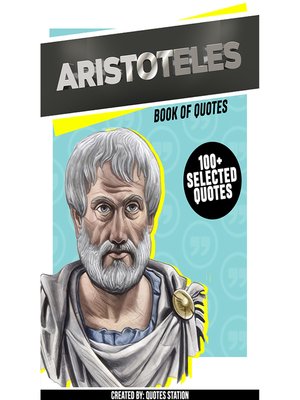
Sign up to save your library
With an OverDrive account, you can save your favorite libraries for at-a-glance information about availability. Find out more about OverDrive accounts.
Find this title in Libby, the library reading app by OverDrive.



Search for a digital library with this title
Title found at these libraries:
| Loading... |
ARISTOTLE: BOOK OF QUOTES
-
ABOUT ARISTOTLE
Aristotle (/ærɪˈstɒtəl/; Greek: Ἀριστοτέλης Aristotélēs, pronounced [aristotélɛːs]; 384–322 BC) was a Greek philosopher and polymath during the Classical period in Ancient Greece. Taught by Plato, he was the founder of the Lyceum, the Peripatetic school of philosophy, and the Aristotelian tradition. His writings cover many subjects including physics, biology, zoology, metaphysics, logic, ethics, aesthetics, poetry, theatre, music, rhetoric, psychology, linguistics, economics, politics, meteorology, geology and government. Aristotle provided a complex synthesis of the various philosophies existing prior to him. It was above all from his teachings that the West inherited its intellectual lexicon, as well as problems and methods of inquiry. As a result, his philosophy has exerted a unique influence on almost every form of knowledge in the West and it continues to be a subject of contemporary philosophical discussion.
-
QUOTES SAMPLES
"A friend to all is a friend to none."
—
"All human actions have one or more of these seven causes: chance, nature, compulsions, habit, reason, passion, desire."
—
"At his best, man is the noblest of all animals; separated from law and justice he is the worst."
—
"Courage is the first of human qualities because it is the quality which guarantees the others."
—
"Criticism is something we can avoid easily by saying nothing, doing nothing, and being nothing."
—
"Character may almost be called the most effective means of persuasion."
—
"A likely impossibility is always preferable to an unconvincing possibility."






